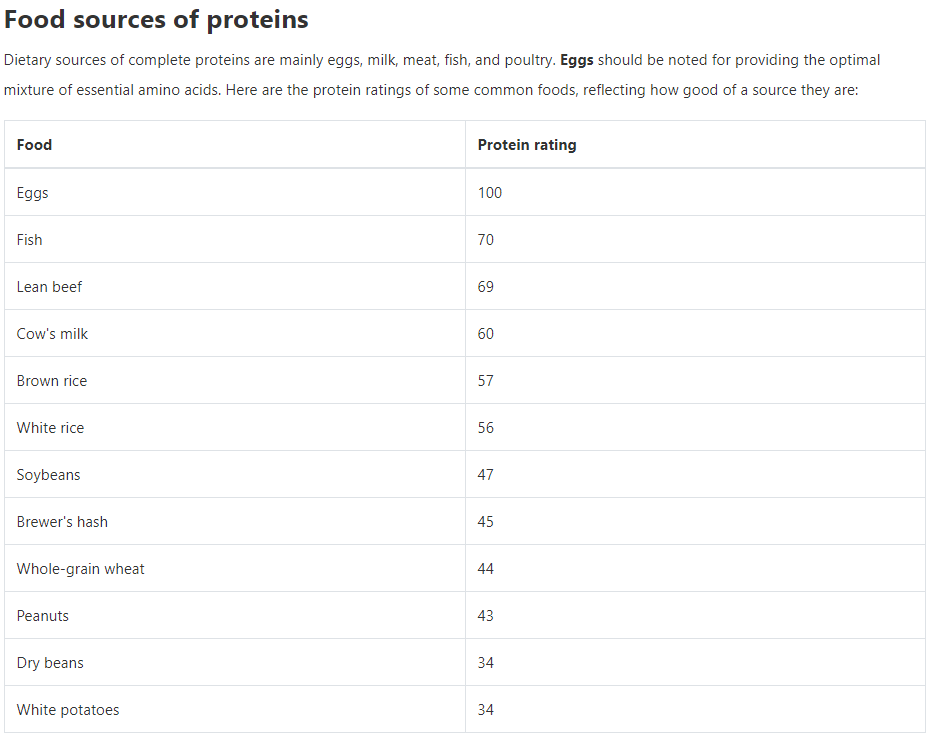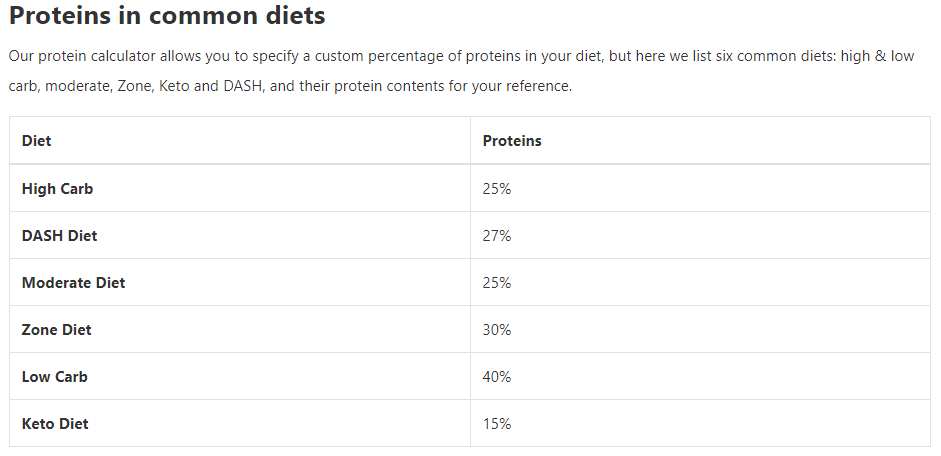Nutrition/Protein Calculator
Body Mass Index (BMI) Calculator, Ideal Body Weight Calculator, Daily Calorie Intake Calculator, Calories Burned Calculator, Calorie Calculator
Protein Calculator
This protein calculator estimates your total daily energy expenditure (TDEE) and then calculates a percentage of it, depending on the selected protein percent of your total calorie intake.
To calculate your calorie needs, you have to enter age, gender, height, weight and activity level (includes exercise and other physical activity), which are all needed for the estimation. Finally, enter the percentage of total calories that you want to consume in proteins - you can check a list of proteins in common diets below. The protein calculator will display the amount (in ounces or grams) and caloric equivalence of the proteins you need to eat per day.
What are proteins?
Proteins are one three main sources of daily energy supply (macronutrients): carbohydrates, proteins and fats. All of them are essential in maintaining a healthy life and good exercise condition, but different diets and different goals will call for a different percentage of proteins. Our protein calculator is here to help you estimate how much protein-rich food you need to eat to fulfill your diet plan.
A typical adult human body usually contains 10-12 kg (22 - 26.5 lb.) of proteins, which has an energy equivalent of about 18-19,000 kCal. Most of it is located within skeletal muscle mass. Protein forms from amino acid building-block linkages with peptide bonds joining amino acids in chains, forming many diverse forms and chemical combinations: dipeptides, tripeptides, various polypeptides... Due to this variety, even one cell can contain thousands of different proteins, while a typical adult body contains approximately 50,000 different protein-containing molecules with differing biochemical functions.
While the body requires 20 amino acids, there are two major types: essential and non-essential. Essential amino acids are indispensable as they must be ingested through food. There are 8 such types of acids. The remaining 12 are non-essential amino acids. They can be synthesized from the body itself in normal quantities to support life. Please, note this doesn't mean non-essential amino acids are not important for the functioning of the body.
Unlike carbs and fats (lipids), proteins are not "stored" in reservoirs in the body, instead they are only found as tissue building blocks, plasma membranes and internal cellular material. Proteins are a key ingredient in maintaining and increasing muscle mass. Tissue synthesis (anabolism) accounts for more than 30% of protein intake early on in life, but the percentage declines with age. Amino acids degrade continually and adequate intake is still necessary for replacements, which is one more reason to use a protein calculator to estimate an adequate level of protein in your food regime.

Food sources of proteins
Dietary sources of complete proteins are mainly eggs, milk, meat, fish, and poultry. Eggs should be noted for providing the optimal mixture of essential amino acids. Here are the protein ratings of some common foods, reflecting how good of a source they are:
To calculate your calorie needs, we need to provide your age, gender, height, weight and level of physical activity. The final piece of information needed is the percentage of total calories that you want to derive from fats. For reference, you can check a list of fats in common diets below. The fat intake calculator will display the amount (in ounces or grams) and caloric equivalent of the fats you need to eat per day. You can then structure your daily diet using this information.
As you can see, both animals and plants produce proteins containing essential amino acids, but whereas animal sources usually provide a complete amino acids mix, individual vegetables usually offer only a limited set of amino acids, therefore food variety is more important when it comes to plant sources. There is no difference in the same amino acid, if it is derived from an animal or vegetable source. Reliance on animal sources for protein is associated with higher intake of cholesterol and fatty acids.
Proteins Meat
Despite being key for muscle building, simply eating a lot of protein will not automatically result in muscle gains, so don't opt for a diet with a very high protein percentage when using the protein calculator thinking that you will become the Hulk. In fact, proteins that are not immediately needed will be transformed or discarded. Consuming too much proteins is not harmless, too, as this would put a strain on your liver and kidneys, which will struggle to process and excrete the excess.
Proteins in common diets
Our protein calculator allows you to specify a custom percentage of proteins in your diet, but here we list six common diets: high & low carb, moderate, Zone, Keto and DASH, and their protein contents for your reference.

How much protein do you need? Optimal protein intake
The generally recommended daily protein intake is 0.9 grams per kilogram of body weight for adolescents and 0.8 grams per kg of body weight for adults (~0.0145 oz per lb. and ~0.013 oz per lb.). You can use our protein requirement calculator to do the math for your weight with high accuracy. This is a minimum that you should not fall below, while the protein calculator here can estimate how much protein you will need to maintain a specific diet. If the recommendation of this calculator is lower than the recommended minimum, then you may need to reconsider your diet, especially if you plan to adhere to it for a longer period of time.
A balanced approach would be to eat about 25% of your calories in the form of proteins. However, each person is different - with a specific health condition and fitness goals and your diet should be decided on accordingly, taking all factors into consideration.
Muscle gain by increased protein intake?
If you are an athlete, looking to increase your muscle mass, simply eating high-protein foods won't help. Dietary protein, after deamination, provides energy or recycles components of non-muscle molecules, or is converted to stored fat in fat depos. Consume too much and you risk liver and kidney damage due to excessive elimination of urea.
First of all, you need adequate caloric intake corresponding to your exercise level, since if your intake is insufficient, during intense training even augmented protein intake may not be sufficient to maintain proper balance of nitrogen, since a disproportionate percentage of dietary protein will be catabolized to account for the energy deficit. So, you will burn your proteins before they can participate in muscle development.
In fact, the common practice of eating and drinking predigested protein in the form of shakes, powders, pills or bars, may be counter-productive. There is no clinical evidence suggesting that the simple amino acids contained in those products absorb more easily or facilitate muscle growth. There is evidence to the contrary: that the small intestine absorbs amino acids more rapidly if they are part of more complex molecules. The result of consuming simple amino acids may be to draw water into your digestive system, resulting in cramping and diarrhea in certain cases.
In most cases, the increased food intake needed to sustain an athletic, weight-lifting, resistance training or endurance training should be enough to maintain adequate protein levels in the body. The estimated requirement is for 1.2 - 1.8 grams per kg of body mass daily, which is usually accounted for in an adequate diet, but you can cross-check it with our protein requirement calculator by selecting a corresponding health condition, e.g. "intensive training". This may not be true if you are training hard while limiting your food intake in order to remain in a certain competition-level weight category (as in boxing, wrestling, etc.).